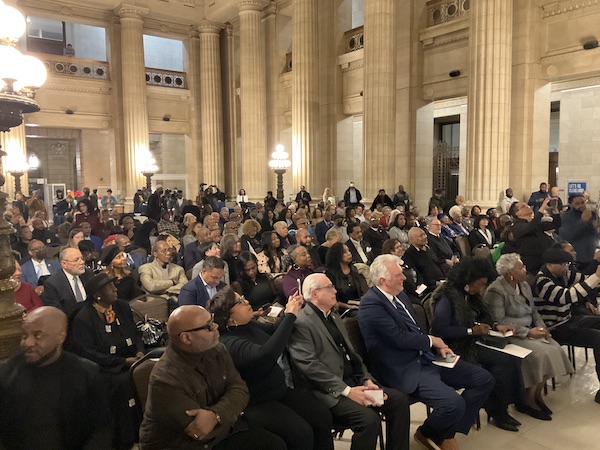
[R. T. Andrews / The Real Deal Press]
It’s a mere ten-minute walk from where Jeff Johnson grew up on the west edge of his Glenville neighborhood to the #1 St Clair bus line that could zip him directly to what was still a bustling compact downtown where the establishment presided over the region’s political and business affairs.
Six decades later, the talented youngster has now achieved elder status in that vastly changed leadership circle by virtue of his election in November as a Cleveland Municipal Court judge.
His ceremonial investiture as judge last week at Cleveland City Hall was rightfully celebrated as a community victory. The invocation was offered by a director of the Cleveland Foundation. Congratulatory remarks and reminiscences were offered by the County Executive and the chairman of the county Democratic Party. Close to two dozen elected officials, including many sitting judges, current and former city council presidents, and old state legislative colleagues from as far away as Cincinnati, were in the crowd of more than 100 well-wishers.
Last night’s joyful scene could hardly have been imagined when Johnson first entered public life in the 1980s as a fierce city councilman. In a legendary episode, the president of city council president hurled a chair at him, accompanied by some spiteful and bitter language.
The pivotal event of Johnson’s life that made last night’s celebration so unlikely occurred during Johnson’s tenure in the state Senate. Shortly after running unsuccessfully to succeed Congressman Lou Stokes in 1998, Johnson was indicted on federal charges. Tried and convicted, Johnson lost his law license as well as his freedom when he was sentenced to the federal prison in Elkton, Ohio.
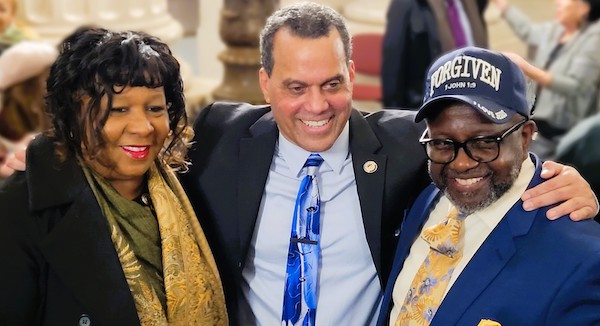
Judge Jeff D. Johnson with Yvonka Hall and the Rev. Jimmie Lee Gates [Photo Credit: Latif Hughes]
Yvonka Hall, executive director of the Northeast Ohio Black Health Coalition and co-founder of the Cleveland Lead Safe Network, captured the spirit of the occasion when she talked about the symbolism of Johnson’s bounce back.
“We don’t talk enough about redemption in our community. He will have an opportunity to model that, especially to show young black men they don’t have to be limited by their past.”
The new judge said last night that during his incarceration he had no one to speak with except God. Sustained by faith and family during those dark days, Johnson completed his sentence and returned home humbled, but determined to rebuild his life. His career is now a triumphant story of individual and community success, an illustration of the principle that it takes a village to reintegrate a returning citizen.
Former mayor Jane Campbell withstood public outcry to offer Johnson a position in community relations. His skill set paved his rise in the department to the point where he could ask his former constituents to return him to his previous office as councilman. Thanks to several of the many individuals he acknowledged last night — specifically former Congressman Stokes, attorney John Martin, Judge Nancy McDonnell, all now deceased, and US District Court Judge Kathleen M. O’Malley — Johnson was able to have his conviction sealed, regain his law license, and begin to consider running for a judgeship himself.
Redemption and empathy were the common themes expressed by all the speakers on the program. The former referenced the second chance Johnson received and took advantage of upon his release and return. The second theme was the expectation that Johnson would be able to pay it forward in terms of dispensing justice informed by lived experience. The joy that permeated the audience was a reflection of both affection for the man, whose career has been centered on his ability to connect with individuals and communities, and the understanding of how deep the need is for a more empathetic court, where the docket largely consists of misdemeanor charges, the kinds of traffic offenses and debt collection cases, any one of which carries the potential to unravel the lives of citizens whose lives were being lived on margins and precipices even before they were summoned to court.
Two of the program’s speakers deserve special mention. One is Cleveland Housing Court Judge W. Monà Scott, who gave Johnson an opportunity to work in her court and gain valuable experience. She was among those who provided early inspiration and encouragement for him to consider becoming a judge.
The other is Lynnie Powell, who serves as regional political director for the Ohio Democratic Party. She was the first person to understand that Johnson could be elected, and she was instrumental in developing the strategy and resources to make it happen. The applause she received upon her introduction was testimony to how many in the audience understood their own electoral successes were due in no small measure to her counsel and support.
Powell’s remarks were short and heartfelt. She captured the sentiment of the evening when she cited Nelson Mandela’s wish to be measured by how many times he rose after being knocked down.
Johnson’s public service embraces legislative, executive, and judicial experience. Many in the audience acknowledged Johnson’s hard work and community involvement during his decades-long career. Now, as a sitting judge, Johnson will have the opportunity to put a capstone on his public service.
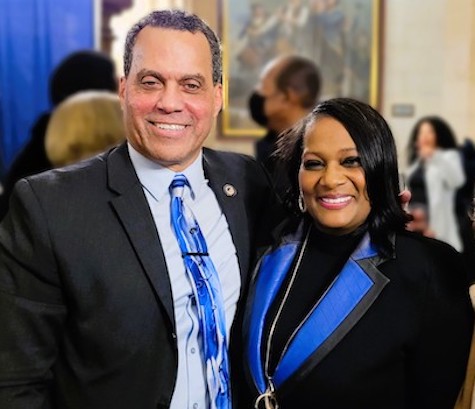
Judge Johnson with Bailiff Lucretia Bolden
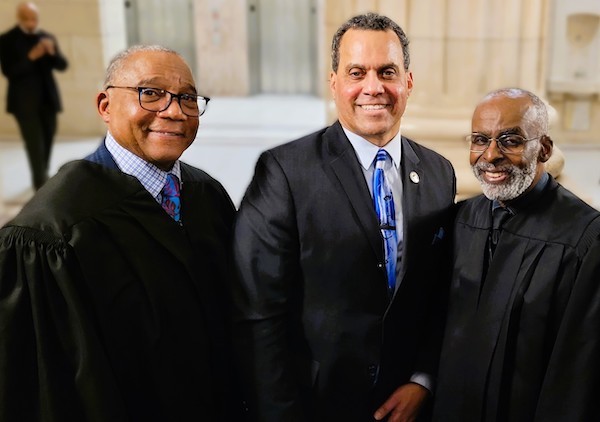
Judge Johnson flanked by retired Judges Michael Nelson and Ronald B. Adrine
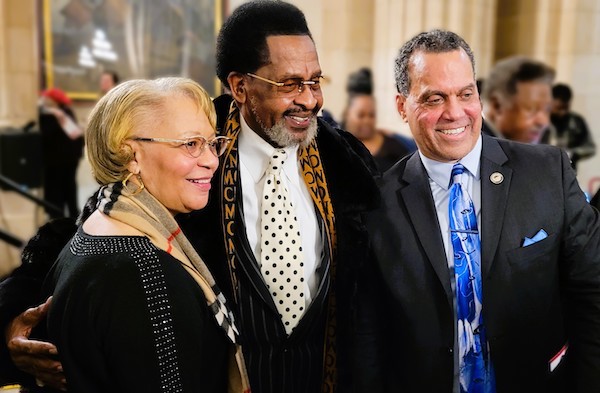
Judge Johnson with the Rev. Larry Howard and Gwendolyn Howard
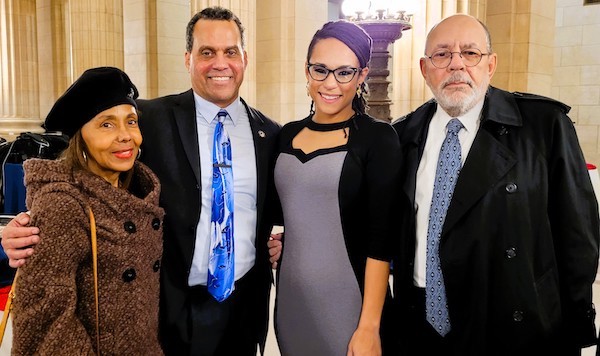
Judge Johnson, with Millicent Saffold, Judge Sydney Saffold, and Dr. Oscar Saffold
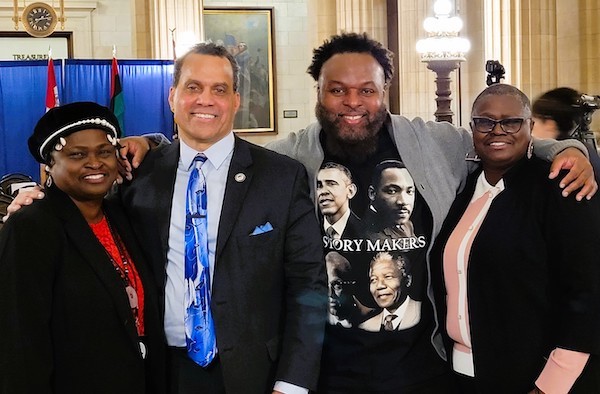
Judge Johnson with Cleveland Ward 4 councilwoman Deborah Gray, photographer Latif Hughes, and former Ward 5. councilwoman Delores Gray
[All photos courtesy of Latif Hughes unless otherwise indicated]
This article was updated to reflect the correct spelling of the names of Judge Nancy McDonnell and Judge W. Monà Scott.
• • •• • •













